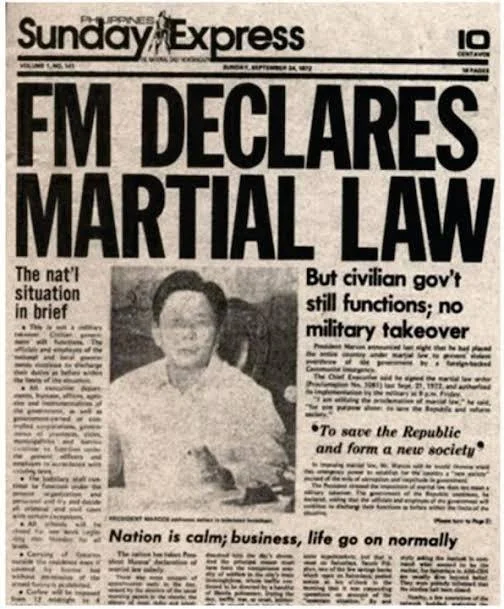by Manuel Manolo Magracia Jr. October 6, 2021 An edition of Philippine’s Sunday Express (Sept. 24, 1972) published after the declaration of ...
October 6, 2021
 |
| An edition of Philippine’s Sunday Express (Sept. 24, 1972) published after the declaration of Martial Law on September 21, 1972. Credits: Pinterest.ph |
We've just seen a slew of "NEVER AGAIN" and “NEVER FORGET” social media’s postings or rants commemorating the fateful declaration of martial law by the late President Ferdinand Marcos 49 years ago. After the episode featuring Ferdinand "Bongbong" Marcos Jr. in the Youtube channel by Toni Gonzaga, a Filipina celebrity and vlogger, she received nasty comments and insults from the bashers, resulting in another historical trauma for both pro- and anti-Marcos. But, as for myself, I have no personal experience with or knowledge of martial law. Like most of the people reading this, I was not born at that time.
All I have stories and anecdotes my father used to tell. The day Martial Law (September 21, 1972) declared, my father was joined in the rally at EDSA. He was a chairman of PDP-Laban in Area 1 of Baclaran, Paranaque City that became all-around activist that time. Until, he neglected his work as deskman from The Evening Post for sometime but he came back and was seems oblivious to the rampant rallying when asked by his boss.
There are more tales. After Cardinal Sin requested support, majority of our lolos and lolas demanded that everyone travel to EDSA. Tanks, free sandwiches, nuns, flowers, bodies hungfrom towers, scavengers ransacking Malacanang in the aftermath, and the strange calm that followed. Books, newspaper stories, web articles, talks, family, and everyone who knew and cared to tell us can find everywhere. I know it's nothing compared to what the've witnessed and experienced, but I've always wanted to travel back in time since there's so much we don't know. History fascinates me. But what of others? Let’s dive to the two sides of the post-Martial Law era.
True enough, it is easy to forget. Little of the past generation's passion for history is evident today. It's seems so easy for most now to say, well, that was 49 years ago, it can't hurt now. In other side, they all vowed, "Never Again" or “Never Forget”, again and again, didn't they? But for others, it's a new day, a new era amidst of COVID-19 pandemic. Let's move on, shall we? Everybody promised a rebuilding, a renewal, and with that came contentment, and for others, amnesia.
How lucky our generation is! We did not have to suffer the direct pains of the past. And yet how unfortunate still, because we have little way of knowing what we cannot even understand. History is still alive in the present, and to be unaware of that is totally blind because we are living in what renowned historian Renato Constantino calls the continuing past. We ask ourselves what use have we for history? What is important is today. The endemic and pandemic problems confronting the society, the abject poverty and the decay of the terrorism. These are our present fights. While the long buried ghosts of the past is important aspect too. Yet, we fail to see that the present will be forever linked to the past. We have to value it, not anger or hate.
Today, we need to know how the political individuals used people's money to buy houses and shoes and jewelry, so that we would not patronize and deify these spoils, and the succeeding and equally rotten administrations. We need to know how riches robbed in order to sustain the lifestyle, so we would not condone the future gallivanting of political families, and other elite individuals and dynasties who had a hand in pushing the country to its darkest era. But some people need to remember how Martial Law used military to infuse terror in the psyche of the people, so that today we can recognize the difference between protecting an upholding "strong republic" and establishing a militaristic rule. It further reminded of the thousands upon thousands of innocent and vigilant civilians killed, and realize it's alarming parallelism to today's political status quo. In these comparison of bad things, we can learn the values of lesson.
To shout "never again" does not mean to push away and forget, much like what was happened to former president Joseph Estrada or corruption or every other deplorable and shameful element in our society that we have chosen to ignore. For me, "never again" or “never forget” means to understand, to know what has gone past and ensure it remains there. And we have failed to understand the meaning of the past.
The past is gone, yet we need a really good recall of it in order to tell right from wrong now. History repeats itself only when people lose sight of its significance. We must remember now because it is through remembering that we will be able to achieve atonement. "I write to give people like you historical memory," said F. Sionil Jose, a National Artist and veteran writer. These remarks are an attempt to inculcate the historical memory with importance that previous and present generations have failed to do so and that we desperately need today. Whether the image of martial law is positive or negative we are still Filipinos seeking redemption.
We hope that while they are only words, and even though we did not exist four decades ago, we will, today and from hereon, remember.








No comments